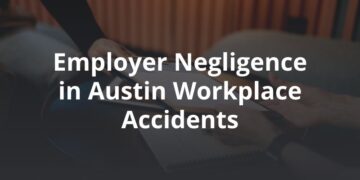Not all car accidents involve just two drivers and two motor vehicles. Some involve three or more drivers or someone not present at the scene, such as a vehicle part manufacturer. It is important to have an Austin personal injury lawyer review your case to determine if multiple parties can be held liable, or financially responsible, for your losses. If so, your lawyer can go up against all liable parties to pursue justice on your behalf.
Who Pays for a Car Accident in Texas?
Most states in the U.S. use either fault or no-fault car insurance laws. In a fault state, the person or party at fault for causing a motor vehicle accident is liable and must pay for the victim’s medical bills and property repairs. In a no-fault state, all drivers involved in a car accident seek compensation from their own car insurance policies, regardless of fault.
Texas is a fault state. After a car accident takes place in Texas, anyone injured or affected by the crash can seek financial compensation (also known as damages) for their losses from the at-fault driver’s or party’s insurance provider. The injured victim must prove that the other party is at fault to qualify for coverage.
What Is Negligence?
Most car accident cases in Texas are brought on the legal grounds of negligence. In personal injury law, someone is negligent if he or she fails to act with reasonable or ordinary care. When a car accident claim is filed in Texas, the claimant (plaintiff) must present evidence of negligence to receive compensation from the at-fault party (defendant).
Negligence consists of four legal elements:
- Duty of care
- Breach of duty of care
- Causation
- Damages
Proving negligence in a car accident case requires evidence that the defendant had a responsibility to act with reasonable care toward the plaintiff, such as the duty that all motor vehicle drivers have to prevent collisions, but that this duty of care was not met. There must be evidence that this was the proximate or actual cause of the car accident and that the plaintiff suffered damages or losses as a result.
Joint and Several Liability in a Texas Car Accident Claim
In Texas, it is possible to hold more than one party liable for a car accident. Section 33.013 of the Texas Civil Practice & Remedies Code addresses the issue of “joint and several liability,” or dividing responsibility for a car accident among multiple parties. Under this law, a defendant is liable to a claimant only for the percentage of the damages found equal to that defendant’s percentage of liability for the plaintiff’s losses.
In a car accident case involving multiple liable parties, each defendant will be assigned a percentage of responsibility by an insurance company, judge or jury. The defendant will be held jointly and severally liable for paying for his or her percentage of fault. This rule will only apply if the defendant’s percentage of responsibility for the car accident is greater than 50 percent or if the defendant acted with specific intent to harm.
What Is Texas’s Modified Comparative Negligence Rule?
The legal issue of joint and several liability may also involve the injured victim or plaintiff’s own percentage of fault for the car accident under Texas’s modified comparative negligence law. Tex. Civ. Prac. & Rem. Code § 33 states:
Sec. 33.001. PROPORTIONATE RESPONSIBILITY. In an action to which this chapter applies, a claimant may not recover damages if his percentage of responsibility is greater than 50 percent.
Sec. 33.012. AMOUNT OF RECOVERY. (a) If the claimant is not barred from recovery under Section 33.001, the court shall reduce the amount of damages to be recovered by the claimant with respect to a cause of action by a percentage equal to the claimant’s percentage of responsibility.
Under this law, a car accident victim can still receive compensation as long as the portion of responsibility assigned for the crash is not more than 50 percent. If a percentage of fault is assigned to the plaintiff, his or her financial award will be reduced accordingly.
How Can Comparative Negligence Affect a Car Accident Settlement?
In a car accident case where both the victim and one or multiple defendants are found to share fault, the victim may receive a reduced settlement or judgment award, as long as his or her percentage of fault is less than 51 percent. If the case goes to trial in a Texas court, a judge will reduce the compensation awarded to the victim based on the percentage or level of responsibility assigned for the car accident.
For example, if a defendant is found to be 80 percent at fault for pulling out of a parking lot into the path of an oncoming vehicle but the victim is assigned 20 percent of fault because he or she was speeding, the victim would receive an award that is reduced by an equivalent 20 percent. In this example, if the injured victim’s damages amounted to $100,000, the victim would still receive $80,000.
How to Prove Liability in a Texas Car Accident Case
If you get hurt in an automobile accident in Texas and wish to file a claim against someone else, you will bear the burden of proof. This means you must prove that one or more parties are responsible for causing your crash. A car insurance company will request proof of its policyholder’s negligence and your related losses.
Establishing fault and negligence requires clear and convincing evidence. The burden of proof in a personal injury case is a preponderance of the evidence, which means “more likely to be true than not true.” A car accident attorney in Texas can help you meet your burden of proof by collecting evidence such as police reports, eyewitness statements, expert testimony, photographs, video footage and cell phone records.
When to Contact a Car Accident Attorney for Assistance
If your car accident case involves the liability of more than one party – including the potential defense of comparative negligence – it is important to contact an attorney for legal assistance. These cases are complicated and your eligibility for financial compensation could be on the line.
An Austin car accident lawyer can protect your rights during the insurance claims process to help you collect the compensation you deserve. Call FVF Law at (512) 982-9328 for a free case review.







